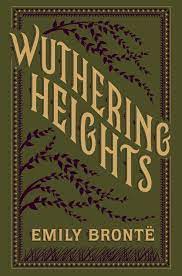Wuthering Heights Page #23
Wuthering Heights is an 1847 novel by Emily Brontë, initially published under the pseudonym Ellis Bell. It concerns two families of the landed gentry living on the West Yorkshire moors, the Earnshaws and the Lintons, and their turbulent relationships with Earnshaw's adopted son, Heathcliff.
“If I can make any sense of your nonsense, Miss,” I said, “it only goes to convince me that you are ignorant of the duties you undertake in marrying; or else that you are a wicked, unprincipled girl. But trouble me with no more secrets: I’ll not promise to keep them.” “You’ll keep that?” she asked, eagerly. “No, I’ll not promise,” I repeated. She was about to insist, when the entrance of Joseph finished our conversation; and Catherine removed her seat to a corner, and nursed Hareton, while I made the supper. After it was cooked, my fellow-servant and I began to quarrel who should carry some to Mr. Hindley; and we didn’t settle it till all was nearly cold. Then we came to the agreement that we would let him ask, if he wanted any; for we feared particularly to go into his presence when he had been some time alone. “And how isn’t that nowt comed in fro’ th’ field, be this time? What is he about? girt idle seeght!” demanded the old man, looking round for Heathcliff. “I’ll call him,” I replied. “He’s in the barn, I’ve no doubt.” I went and called, but got no answer. On returning, I whispered to Catherine that he had heard a good part of what she said, I was sure; and told how I saw him quit the kitchen just as she complained of her brother’s conduct regarding him. She jumped up in a fine fright, flung Hareton on to the settle, and ran to seek for her friend herself; not taking leisure to consider why she was so flurried, or how her talk would have affected him. She was absent such a while that Joseph proposed we should wait no longer. He cunningly conjectured they were staying away in order to avoid hearing his protracted blessing. They were “ill eneugh for ony fahl manners,” he affirmed. And on their behalf he added that night a special prayer to the usual quarter-of-an-hour’s supplication before meat, and would have tacked another to the end of the grace, had not his young mistress broken in upon him with a hurried command that he must run down the road, and, wherever Heathcliff had rambled, find and make him re-enter directly! “I want to speak to him, and I must, before I go upstairs,” she said. “And the gate is open: he is somewhere out of hearing; for he would not reply, though I shouted at the top of the fold as loud as I could.” Joseph objected at first; she was too much in earnest, however, to suffer contradiction; and at last he placed his hat on his head, and walked grumbling forth. Meantime, Catherine paced up and down the floor, exclaiming—“I wonder where he is—I wonder where he can be! What did I say, Nelly? I’ve forgotten. Was he vexed at my bad humour this afternoon? Dear! tell me what I’ve said to grieve him? I do wish he’d come. I do wish he would!” “What a noise for nothing!” I cried, though rather uneasy myself. “What a trifle scares you! It’s surely no great cause of alarm that Heathcliff should take a moonlight saunter on the moors, or even lie too sulky to speak to us in the hay-loft. I’ll engage he’s lurking there. See if I don’t ferret him out!” I departed to renew my search; its result was disappointment, and Joseph’s quest ended in the same. “Yon lad gets war und war!” observed he on re-entering. “He’s left th’ gate at t’ full swing, and Miss’s pony has trodden dahn two rigs o’ corn, and plottered through, raight o’er into t’ meadow! Hahsomdiver, t’ maister “ull play t’ devil to-morn, and he’ll do weel. He’s patience itsseln wi’ sich careless, offald craters—patience itsseln he is! Bud he’ll not be soa allus—yah’s see, all on ye! Yah mun’n’t drive him out of his heead for nowt!” “Have you found Heathcliff, you ass?” interrupted Catherine. “Have you been looking for him, as I ordered?” “I sud more likker look for th’ horse,” he replied. “It ’ud be to more sense. Bud I can look for norther horse nur man of a neeght loike this—as black as t’ chimbley! und Heathcliff’s noan t’ chap to coom at my whistle—happen he’ll be less hard o’ hearing wi’ ye!” It was a very dark evening for summer: the clouds appeared inclined to thunder, and I said we had better all sit down; the approaching rain would be certain to bring him home without further trouble. However, Catherine would not be persuaded into tranquillity. She kept wandering to and fro, from the gate to the door, in a state of agitation which permitted no repose; and at length took up a permanent situation on one side of the wall, near the road: where, heedless of my expostulations and the growling thunder, and the great drops that began to plash around her, she remained, calling at intervals, and then listening, and then crying outright. She beat Hareton, or any child, at a good passionate fit of crying. About midnight, while we still sat up, the storm came rattling over the Heights in full fury. There was a violent wind, as well as thunder, and either one or the other split a tree off at the corner of the building: a huge bough fell across the roof, and knocked down a portion of the east chimney-stack, sending a clatter of stones and soot into the kitchen-fire. We thought a bolt had fallen in the middle of us; and Joseph swung on to his knees, beseeching the Lord to remember the patriarchs Noah and Lot, and, as in former times, spare the righteous, though he smote the ungodly. I felt some sentiment that it must be a judgment on us also. The Jonah, in my mind, was Mr. Earnshaw; and I shook the handle of his den that I might ascertain if he were yet living. He replied audibly enough, in a fashion which made my companion vociferate, more clamorously than before, that a wide distinction might be drawn between saints like himself and sinners like his master. But the uproar passed away in twenty minutes, leaving us all unharmed; excepting Cathy, who got thoroughly drenched for her obstinacy in refusing to take shelter, and standing bonnetless and shawlless to catch as much water as she could with her hair and clothes. She came in and lay down on the settle, all soaked as she was, turning her face to the back, and putting her hands before it. “Well, Miss!” I exclaimed, touching her shoulder; “you are not bent on getting your death, are you? Do you know what o’clock it is? Half-past twelve. Come, come to bed! there’s no use waiting any longer on that foolish boy: he’ll be gone to Gimmerton, and he’ll stay there now. He guesses we shouldn’t wait for him till this late hour: at least, he guesses that only Mr. Hindley would be up; and he’d rather avoid having the door opened by the master.” “Nay, nay, he’s noan at Gimmerton,” said Joseph. “I’s niver wonder but he’s at t’ bothom of a bog-hoile. This visitation worn’t for nowt, and I wod hev’ ye to look out, Miss—yah muh be t’ next. Thank Hivin for all! All warks togither for gooid to them as is chozzen, and piked out fro’ th’ rubbidge! Yah knaw whet t’ Scripture ses.” And he began quoting several texts, referring us to chapters and verses where we might find them. I, having vainly begged the wilful girl to rise and remove her wet things, left him preaching and her shivering, and betook myself to bed with little Hareton, who slept as fast as if everyone had been sleeping round him. I heard Joseph read on a while afterwards; then I distinguished his slow step on the ladder, and then I dropped asleep.
Translation
Translate and read this book in other languages:
Select another language:
- - Select -
- 简体中文 (Chinese - Simplified)
- 繁體中文 (Chinese - Traditional)
- Español (Spanish)
- Esperanto (Esperanto)
- 日本語 (Japanese)
- Português (Portuguese)
- Deutsch (German)
- العربية (Arabic)
- Français (French)
- Русский (Russian)
- ಕನ್ನಡ (Kannada)
- 한국어 (Korean)
- עברית (Hebrew)
- Gaeilge (Irish)
- Українська (Ukrainian)
- اردو (Urdu)
- Magyar (Hungarian)
- मानक हिन्दी (Hindi)
- Indonesia (Indonesian)
- Italiano (Italian)
- தமிழ் (Tamil)
- Türkçe (Turkish)
- తెలుగు (Telugu)
- ภาษาไทย (Thai)
- Tiếng Việt (Vietnamese)
- Čeština (Czech)
- Polski (Polish)
- Bahasa Indonesia (Indonesian)
- Românește (Romanian)
- Nederlands (Dutch)
- Ελληνικά (Greek)
- Latinum (Latin)
- Svenska (Swedish)
- Dansk (Danish)
- Suomi (Finnish)
- فارسی (Persian)
- ייִדיש (Yiddish)
- հայերեն (Armenian)
- Norsk (Norwegian)
- English (English)
Citation
Use the citation below to add this book to your bibliography:
Style:MLAChicagoAPA
"Wuthering Heights Books." Literature.com. STANDS4 LLC, 2024. Web. 29 Nov. 2024. <https://www.literature.com/book/wuthering_heights_1627>.




Discuss this Wuthering Heights book with the community:
Report Comment
We're doing our best to make sure our content is useful, accurate and safe.
If by any chance you spot an inappropriate comment while navigating through our website please use this form to let us know, and we'll take care of it shortly.
Attachment
You need to be logged in to favorite.
Log In